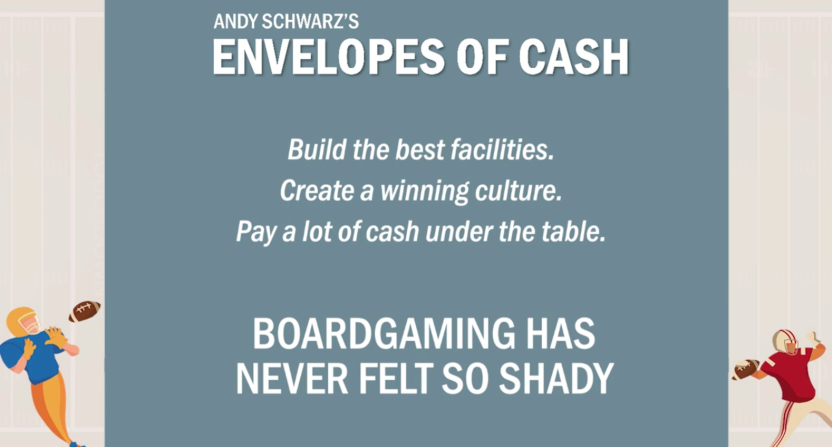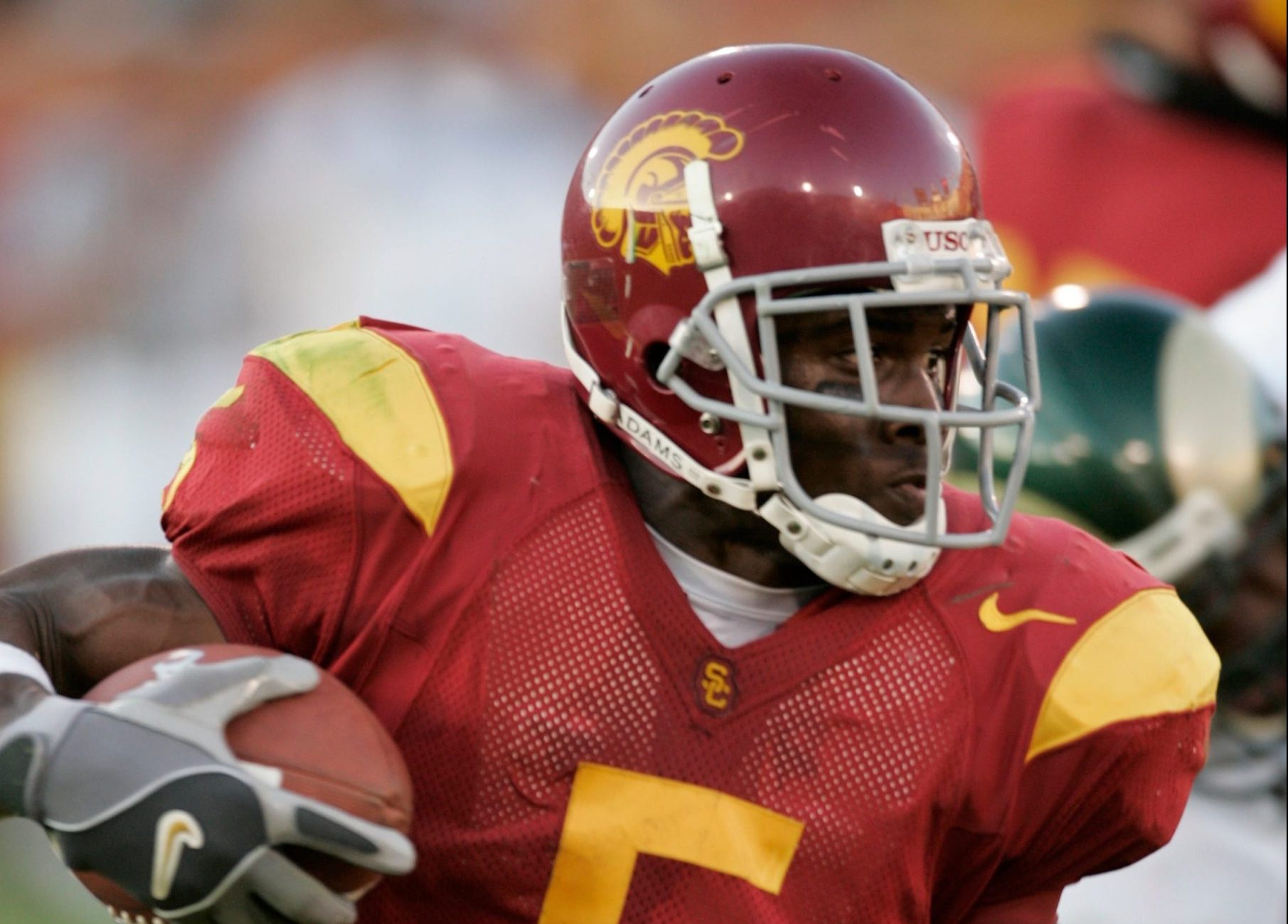The last few years have seen repeated funding records for board games on Kickstarter (and also on alternative platforms), and that’s led to growth in unexpected themes. One that’s certainly unexpected is “college football recruiting,” but that’s what Andy Schwarz is exploring with “Envelopes of Cash.” That project, set to launch on Kickstarter on Tuesday, sees players take the roles of various college football programs trying to lure recruits by means both aboveboard and not so much. Here’s the start of that game’s description from its Board Game Geek page:
Envelopes of Cash is a Euro board game with a very American theme: college football recruiting. Players square off as rival college programs, doing their best to attract the most valuable high schoolers to join their college teams.
Schwarz spoke to AA via e-mail recently about his gaming history, his work in college sports, what led him to design this game, and more. To start with, he said that this particular design came out of the COVID-19 pandemic, which helped him find the time to put in the work to push an idea further than he had in the past with designs:
“What was different this time was COVID-19. There was only so many Keto Bread recipes I could invent, etc. And I had had this idea bouncing around in my head to make a game pretending I was Stefan Feld, but that instead of being born in Karlsruhe, in Baden-Wurttemberg in Germany, what if he had been born in Tuscaloosa, Alabama in the USA as an SEC fan. And so the game of Macao would not have been based on a classic European theme of the Age of Exploration and the exploiting of an island’s luxury goods and then transporting them from China to Europe, but instead about exploiting the system of amateurism to develop a college football program.”
Schwarz said he wanted to make a game where the theme closely connected with the mechanics.
“I had a few other goals as well—to try to make the theme a little less pasted on. To try to subtly make a statement about amateurism by normalizing the payment of the envelopes of cash. But mostly I wanted to make a really good Euro that would perhaps resonate more with Americans than a game about, say, running a medieval farm, or a European port warehouse, or a medieval trade network or postal network, or Viennese hotel, or any of the other themes in the great Euros I love. But the moment you say out loud what the game is about, you know the average American is going to look at you like ‘And you play this because… why?'”
Schwarz said tabletop games are a hobby for him that dates back decades.
“I started playing ‘real’ board games in 6th grade, which means in the late 1970s. I had gotten into Dungeons and Dragons, and was convinced to go up to a convention in Maine with my D&D friends, and I saw people playing a historical war game with lead miniatures which just blew me away. I was already a history nerd (and ended up getting two degrees in European history before changing life paths and becoming an antitrust/sports economist). And so, seeing people reacting a charge of 14th-century French cavalry against English longbows with these beautifully-painted miniatures, when prior to this all I’d ever seen on a tabletop were games like Monopoly or The Game of Life, was world-altering.”
“I quickly found out about Avalon Hill and SPI board games and by the time I was in 10th grade, I started the War Games club at my high school, only to make it palatable to the administration, we called it the Historical Simulations club. We would play games like Civilization (the board game that inspired Sid Meier) or Diplomacy or Squad Leader (or more obscure ones like The Origins of World War II or Russian Civil War) after school on Fridays until the janitors kicked us out. And invariably, we never finished a full game except Diplomacy, which we would continue over the course of the week during school, turning in our moves during lunch each day.”
He said that gaming interest dropped off at first in college, but he rediscovered it in graduate school.
“When I went off to college, a lot of this gaming fell by the wayside because the time needed to play just wasn’t there. But in grad school the urge to play started coming back, especially when I discovered the games in the We The People series by Mark Herman, which spawned a whole series of great games, my favorite being Hannibal: Rome vs. Carthage by Mark Simonitch. I pretty much played that, and History of the World in that era and only rarely because I was married and had a small child and so once again time became scarce.”
“Also during this time, I played a ton of Diplomacy on the Judge system on the internet in the early days just before the web really took off, and I even won the 1995 world championship (well, co-won, as the final match was a 3-way draw, as Diplomacy matches tend to be). I wrote a lot for a magazine called the Diplomatic Pouch, even finding some paradoxes in the Diplomacy rules where there was no way to resolve certain combination of player moves (if you assume move A succeeded, then B would succeed causing A to fail, which caused B to fail, which caused A to succeed, etc.). I also designed 2 Diplomacy variants which got published (Hundred & Classical) but did not sell a ton of copies.”
“Then my daughter Abby got into roleplaying as a young kid, around 8 or so, and her group was encouraged to go to KublaCon, a big Bay Area convention that is very little-kid-friendly. So I used it as an opportunity to see how the gaming world had changed, and it was there I discovered the German board game revolution. I think that was the con I first played a bunch of games that I still consider my favorites including Hansa Teutonica, Thurn und Taxis, and Saint Petersburg, though I may be blending two years into one. In any event, the idea that games with a real strategic core could be started and finished in two hours or less, without the janitors coming and kicking us out was amazing. And even though games like Hannibal were so much less complex than Squad Leader, I found the elegance of a game like Hansa Teutonica to be mind-blowing.
“Soon thereafter, I was turned on to Yucata, and from there I was a convert to Euros, diving in as deep as I had once been into Diplomacy (although I did not start writing strategy articles, so maybe not quite so deep).”
He said many of his current favorite games are Euros available for remote play on Yucata.
“My current favorites (leaving Envelopes of Cash to the side for the time being) are mostly games that can be played on Yucata, with the exception of Hansa Teutonica, which I just love and wish was easier to play online than it is. I’ve been really into Grand Austria Hotel (or GAH), Lost Ruins of Arnak, Murano, and I still play a lot of Thurn und Taxis because I compete in it regularly in The Meeple League, where I am not quite good enough for the first rank of tables but consistently do ok on the 2A or 2B tables. I also really like Stefan Feld and Uwe Rosenberg games, and should give Macao and At the Gates of Loyang both a shout out because those two games are the most easily seen as influences for key elements of Envelopes of Cash.”
Schwarz said this particular design started with Feld’s Macao, but it soon evolved to be quite different.
“I started with Macao‘s 120 cards divided into three categories, with a payment system based on resources you get from dice. That seemed like a good generic blend of income generation and use of the income. I got rid of the rondel system and replaced it with a calendar. I also got rid of Macao‘s “pick up and deliver” mechanism and replaced it with a “deliver” mechanism or a sorts — that is, instead of getting resources (cubes in Macao) to buy goods and then shipping those goods and selling them, in Envelopes of Cash, you just bring the envelopes directly to the recruits without having to acquire some intermediate good. Once you remove that mechanic, you’ve essentially created a very different game.”
“From there, the Macao influence increasingly waned: the map changed entirely, the idea of there being a first, second, and third- place delivery went away, etc. I could recite the Macao rules and tell you that I jettisoned them all but that would be dull, but essentially, think of the spine of the game being that one Macao element and then from there a brand new game developing slowly around it. When I rebuilt the card drafting system, I looked to Loyang, which has a fun little drafting system, and I modified the way Loyang does it for EoC. I introduced a set collection component which I would say is maybe more like Stone Age than anything else, but certainly not like either of these two main influences – or maybe it came to me from Saint Petersburg where aristocrat collection is well rewarded at the end of the game.”
“Essentially, each time I sat down to play the game, I added a scoring element until it was not just a point salad, it was a point smorgasbord. Then I stepped back and started paring it down because it was too complex and not in a fun way. I would walk my dog and try to “teach” her the rules and when I couldn’t explain (to my imaginary version of her voice) why a certain rule/mechanic/scoring mechanism was there, I took it out or simplified it. 18 months later, the rules have really stabilized and the last time I took it out for a spin with bran new players, all of the “you should change this” comments had to do with the physical implementation of the cardboard prototypes, not with rules, so I feel pretty good.
He said his particular research focus here helped him create a game that felt thematic on this topic.
“The fact that I have been immersed in the economics of college sports for about twenty years means that I was able to start developing my thematic cards without needing to do the sort of research that I imagine most generalist game designers need to do when they decide to tackle a new theme. Like if I wanted to make a game about working in a car factory, I would need to know more about the assembly line than I do. And while I have never actively recruited a college athlete, I’ve been involve in studying the issues of recruiting for so long that I know the process backwards and forwards and I know people who do it (or at least have done it in the past) for a living, or journalists who cover the process, and so building the theme right into each card was very organic.”
“Then also, being an economist is very much a way of thinking about cause and effect and so I find in general the process of building a coherent set of interlocking rules that work together well isn’t as hard for me as I think it is for some folks. When I finish one rule, I know what it will affect and I can play through the implications and adjust it. Obviously sometimes you under/over-estimate the adjustment you need to make but I feel being an economist helps be get things within an order of magnitude on my first try more often than not. (Fingers crossed!)”
An interesting element of this game is how Schwarz has been designing it for years, but the underlying idea of aboveboard compensation for college athletes has changed dramatically in that time with name, image, and likeness (NIL) rules, something he was actually involved in proposing. He said the game’s general setting is in a pre-NIL timeline.
“I guess EOC is set on June 30, 2021, which is the day before the new NIL rules went into effect. Though, there is one card, which features the portrait of California State Senator Nancy Skinner, which lets the player who puts it into play use over-the-table currency instead of under-the-table currency to recruit athletes, so maybe it’s in an alternate universe where only California adopted NIL and the other 49 states did not.”
“People may not know this, but the NIL laws were my idea. I met Nancy Skinner in 2016 and suggested a CA state NIL bill as one of several options for her to break up the NCAA’s stranglehold on college athletes’ market rights. I have been working on the antitrust issues related to college athletes economic rights going back to 2003, and studying the issue for even longer, all the way back to 1999.”
Schwarz said he’s somewhat pleased with what athletes can gain for their name, image and likeness now, but there’s still much to be done to make this truly fair for them.
“So, on the one hand it has been gratifying to see athletes finally see this aspect of their economic rights restored, but it’s frustrating to me that most people seem totally fine that there is still a hard line with schools insisting that they be immune from having to pay for college athletes’ athletic services as if they have a God-given right to those services at below-market rates. And that now that athletes can have side hustles, that’s enough. But “that’s enough” is never the right answer when it comes to the rights of a citizen. Citizenship (for adults anyway) means getting all of the rights of a citizen. When you only get some, you’re a child or a ward of a state or a second-class citizen.”
“So in the language of the game, I won’t be content until all Envelopes of Cash are replaced with Booster Bucks for all transactions involving athletes, not just NIL.”
Read on for more on Schwarz’s inspirations and how Envelopes of Cash fits into the current gaming landscape.





